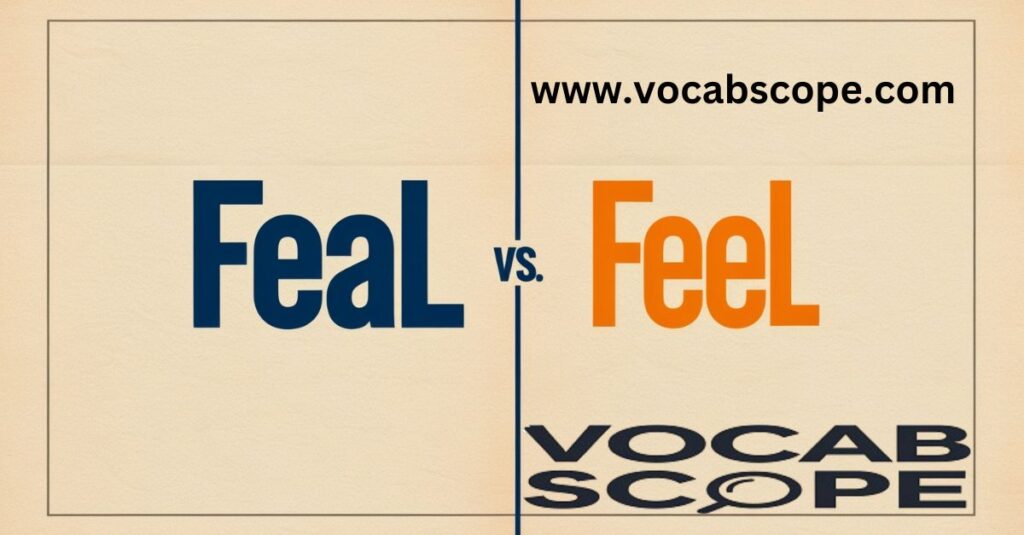Feal and feel sound alike but have distinct meanings. Feal refers to loyalty or faithfulness, while feel relates to sensing or experiencing emotions. Understanding these differences helps ensure you use the right word in your writing.
Many people mix up feal vs feel, but using them correctly can make your writing clearer and more accurate. Proper usage is key to avoiding confusion and enhancing your communication.
In most cases, feal is outdated and mostly found in historical texts. Feel, on the other hand, is used every day to describe sensations and emotions. Knowing how to use feal vs feel enhances your writing.
What Does the Word “Feal” Mean?

The word feal is an archaic term. It originates from the Middle English period, and it’s not commonly used today. Feal is both an adjective and a verb.
- As an adjective, it means loyal or faithful, often used to describe someone who is devoted to a cause or person.
- Historically, it was used in contexts involving knights or lords who were loyal to their sovereigns.
- For example, you might say: “The knight was feal to his king,” which means the knight was loyal to the king.
Must Read: totalling-or-totaling-which-spelling-to-use
Origins of the Word “Feal”
The origins of feal can be traced back to the Old French word féal and the Latin word fidelis, meaning faithful or loyal. It entered the English language in the 14th century, primarily in the Northern English and Northern Midlands regions, where feudal systems were prominent.
In medieval contexts, kings and queens often expected their subjects to be feal, and the word was used to describe this unyielding loyalty. Though it has fallen out of everyday use, it still holds historical significance.
What Does the Word “Feel” Mean?

On the other hand, “feel” is a much more common word in modern English. It’s used in a variety of contexts, typically to describe emotions, physical sensations, or even an atmosphere.
For example, you might say, “I feel happy” or “I feel the soft texture of the fabric.”
Unlike feal, which is more specific to historical loyalty, feel is versatile and can be applied to a wide range of experiences. It comes from Old English and has evolved over time to cover both physical sensations and emotional states.
Origins of the Word “Feel”
“Feel” has been part of the English language since the 14th century. It originated from the Northern English and Northern Midlands dialects, influenced by Old Norse. The word can be traced back to Old English “felan,” which itself comes from Proto-Germanic “foljan.”
Interestingly, “feel” has cognates in other Germanic languages. You’ll find similar words in Old Saxon (gifolian), Old High German (fuolen), and modern German (fühlen).
Read About: Accel or Excel: What Is the Correct Spelling?
“Feal” vs “Feel”: The Differences
“Feal” is archaic and refers to loyalty or faithfulness, whereas
“Feel” is modern and refers to perceiving or experiencing physical and emotional sensations.
| Aspect | Feal | Feel |
| Meaning | Archaic word symbolizing loyalty and allegiance. | Modern verb to sense, perceive, or express emotions. |
| Frequency | Rarely used in contemporary English, almost obsolete. | Widely used in daily communication across various contexts. |
| Historical Use | Associated with loyalty in medieval times, often used to describe a knight’s duty. | Used since ancient times but more relevant to expressing physical sensations or emotions. |
| Cultural Relevance | Predominantly linked to feudal societies and chivalric codes of honor. | Integrated into everyday emotional and sensory descriptions. |
| Example | “The vassal was feal to his lord in all matters of honor.” | “I feel the cool breeze as the sun sets.” |
| Origins | Stemming from Old French “feal,” meaning faithful. | Derived from Old English “felan,” tied to sensations or emotions. |
| Evolution | Lost in modern usage, surviving mainly in historical contexts. | Evolved to cover a broad range of emotional and sensory experiences. |
| Context | Appears in historical literature or poetic works. | Regularly used in both spoken and written communication. |
Synonyms
“Feal” vS “Feel”
To better understand these words, let’s explore some synonyms:
Feal (adj.)
- Loyal
- Faithful
- Devoted
- Trustworthy
- Steadfast
Feal (v.)
- To swear loyalty
- To pledge allegiance
- To remain faithful
Feel (verb)
- Perceive
- Experience
- Sense
- Touch
- Believe
Feel (noun)
- Sensation
- Impression
- Atmosphere
- Vibe
- Emotion
Examples in Context
Let’s dive into some real-world scenarios to illustrate how these words are used:
Feal (adj.)
Imagine you’re reading a historical novel set in medieval times. You might come across a sentence like this:
“Sir Galahad, the most feal of King Arthur’s knights, vowed to protect the realm with his dying breath.”
Here, “feal” emphasizes Sir Galahad’s unwavering loyalty to his king and kingdom.
Feal (v.)
In a similar context, you might encounter the verb form:
“The newly appointed lords gathered before the queen to feal their allegiance to the crown.”
This usage, though rare, showcases the act of swearing loyalty.
Feel (v.)
Now, let’s switch gears to the more common “feel”:
“As I ran my hand across the marble countertop, I could feel its cool, smooth surface beneath my fingertips.”
This example demonstrates the sensory aspect of “feel,” highlighting the physical sensation experienced through touch.
In another context:
“Walking into the dimly lit restaurant, Sarah could feel the romantic atmosphere enveloping her.”
Here, “feel” relates to perceiving an intangible quality or vibe.
Feel (n.)
As a noun, “feel” often describes the overall impression or atmosphere:
“The old bookstore had a cozy feel, with its creaky wooden floors and the scent of aged paper filling the air.”
This usage conveys the general sense or ambiance of a place.
The Impact of Context

Understanding the difference between “feal” and “feel” is crucial for accurate communication. Using “feal” in modern contexts might leave your readers scratching their heads, while misusing “feel” could lead to misunderstandings.
Consider this: If you wrote, “I feal happy today,” your readers would likely assume it’s a typo. But if you’re crafting a historical piece and write, “The feal knight stood guard,” it adds an authentic touch to your narrative.
You will like: Excell or Excel: What is the Correct Spelling?
Modern Usage and Misconceptions
In today’s digital age, where typos run rampant and autocorrect reigns supreme, it’s easy to dismiss “feal” as a mistake. However, recognizing it as a distinct word enriches our understanding of language evolution.
For writers, especially those dabbling in historical fiction or poetry, “feal” can be a valuable addition to their lexical toolbox. It adds a touch of antiquity and depth to character descriptions or loyalty oaths.
The Emotional Spectrum of “Feel”
While “feal” has a narrow, specific meaning, “feel” covers a broad spectrum of emotional states and physical sensations. From the warmth of the sun on your skin to the complex emotions of falling in love, “feel” captures it all.
Consider how we use “feel” to describe both tangible and intangible experiences:
“I feel the cool breeze on my face.” “I feel excited about the upcoming concert.”
This versatility makes “feel” an indispensable part of our everyday language.
Language Evolution: From “Feal” to “Feel”
The journey from “feal” to “feel” showcases the fascinating evolution of language. While “feal” has faded into obscurity, “feel” has expanded its semantic range, absorbing some of the loyalty and devotion connotations once reserved for “feal.”
For instance, when we say, “I feel loyal to my team,” we’re using “feel” to express a sentiment that might have been conveyed by “feal” centuries ago.
Conclusion
Although “feal” and “feel” sound alike, their meanings are different. Feal is an old term for loyalty, while feel refers to emotions and sensations. Using the right word is important for clarity.
While feal is mostly found in historical texts, feel is widely used today to describe emotions and experiences.

“Robert Henry is an experienced blogger with a passion for language and education. His insightful posts on Vocab Scope offer readers valuable tips on vocabulary and grammar. With a background in linguistics and a knack for clear, engaging writing, Robert is dedicated to helping others enhance their communication skills.”






